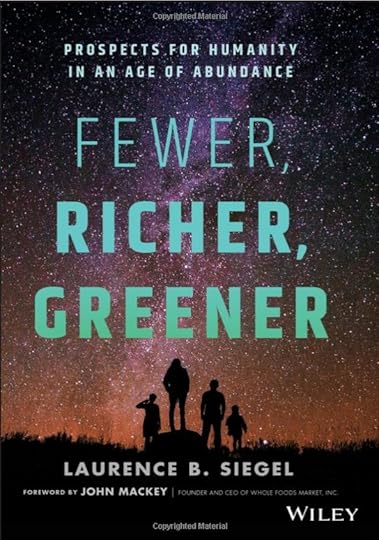Bryan Caplan's Blog, page 28
August 13, 2020
Krugman and Growth Agnosticism
Back in 2004, Robert Lucas famously remarked: “Of the tendencies that are harmful to sound economics, the most seductive, and in my opinion the most poisonous, is to focus on questions of distribution.”
Ten years later, Paul Krugman replied:
It’s fairly common for conservative economists to try and shout down any discussion of income distribution by claiming that distribution is a trivial matter compared with the huge gains from economic growth. For example, Robert Lucas:
Of the tendenc...
August 12, 2020
My All-New “Economics of Immigration” Course

In three weeks, I premiere my all-new course on the “Economics of Immigration.” If GMU sticks to its current plan, I will start teaching it in-person on August 27 to a mixed class of grad students and undergrads. As you’d expect, the class closely follows the organization of Open Borders: The Science and Ethics of Immigration, but with extra time devoted to criticism of immigration from social scientists like George Borjas, Paul Collier, and Garett Jones. The course also adds sections on t...
August 11, 2020
Escaping Paternalism Book Club: Part 5
Summary
When you begin the final chapter of Escaping Paternalism, Rizzo and Whitman (RW) seem ready to rest their case. They neatly recap their nested argumentative strategy:
We began this book with an extended critique of the neoclassical model of rationality, which behavioral economists have rejected as a positive model of human behavior but nevertheless have accepted as a normative standard…
The rest of the book could easily be read as a series of “even if” arguments: even if we accept neocl...
August 10, 2020
Escaping Paternalism Book Club: Jubal Harshaw’s Reaction
Blogger Jubal Harshaw sent me this response to last week’s installment of the Escaping Paternalism Book Club last week. Reprinted with his permission.
Hey Bryan,
Today you wrote:
“4. Once again, I wish the book contained a detailed section on opioids. The usual view, of course, is that Big Pharma’s lobbying prevented wise regulation from paternalistically saving hundreds of thousands of American lives. This is clearly a public choice story, but not one in the spirit of Escaping Paternalism. ...
August 6, 2020
Silence is Stupid, Argument is Foolish
When I was young, I never backed down in an intellectual argument. Part of the reason, admittedly, was that I was starved for abstract debate. Before the internet, anyone who wanted to talk ideas had to corner an actual human willing to do the same. Another big reason, though, was that I didn’t want to look stupid. A smart person always has a brilliant riposte, right? And if you shut up, it must be because you’re stumped.
At this stage in my life, much has changed. Public debates aside, I ...
August 5, 2020
The Uniformity and Exclusion Movement
“The Ministry of Peace concerns itself with war, the Ministry of Truth with lies, the Ministry of Love with torture and the Ministry of Plenty with starvation.”
–George Orwell, 1984
Earth houses a multitude of political movements vastly worse than the “social justice” (or “wokeness”) crusade. North Korean and Chinese communism, Islamic fundamentalism, and Russian nationalism all have far worse intentions and have done far more harm than wokeness ...
August 4, 2020
Escaping Paternalism Book Club: Part 4
Summary
Chapter 8 of Escaping Paternalism provides a vigorous public choice critique of paternalism in general and the “new paternalism” in particular. While they deploy most of the standard public choice arguments, Rizzo and Whitman (RW) also ably turn the tools of behavioral economics against paternalism itself. Real-world paternalists really should proverbially cast the beam out of their own eyes before they decry the motes in the eyes of the populations they aspire to rule.
How can Rizzo a...
August 3, 2020
Escaping Paternalism Book Club: Rizzo and Whitman Response, Part 2
This is the second of a series of responses by Mario Rizzo and Glen Whitman, authors of Escaping Paternalism, for my Book Club on their treatise.
Inclusive Rationality and Falsifiability
In the first installment of the book club, Bryan raised questions about the falsifiability of inclusive rationality, and he wonders if we can offer a concrete example of a potential falsification.
This is an issue that we wrestled with as authors (as indicated by the passages Bryan quoted). We don’t wish to pre...
July 29, 2020
Comments on Siegel’s Fewer, Richer, Greener
Last week, I was part of the Cato Institute’s book forum on Laurence Siegel’s Fewer, Richer, Greener: Prospects for Humanity in an Age of Abundance. Here’s my commentary on the book.
1. Vast areas of agreement:
a. Until March, the world was getting richer at a marvelous pace. Absolute poverty has been disappearing before our eyes after ten thousand years of apparent permanence.
b. Conventional measures sharply understated the glorious reality, because the environment keeps getting cleaner and ...
Escaping Paternalism Book Club: Rizzo and Whitman Response, Part 1
This is the first of a series of responses by Mario Rizzo and Glen Whitman, authors of Escaping Paternalism, for my Book Club on their treatise.
Present Bias and Time Preference
We should begin by thanking Bryan for his many kind words about our book, and also for hosting this book club. We appreciate his critiques almost as much as his praise! Given the many excellent points raised by Bryan and others, we’ve decided to break our reply into a few posts – beginning with the issue of time prefer...
Bryan Caplan's Blog
- Bryan Caplan's profile
- 374 followers



